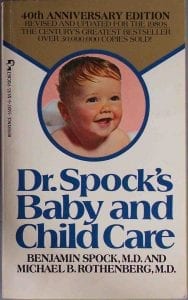
Source: flickr.com
Parenting guides and materials are everywhere. All adults know that guiding children is never easy. These will serve as a guide in raising your children. Most mothers and fathers are frazzled and don’t know where to turn and what to do.
The challenging thing about parenting is that you cannot possibly enroll in a school to try to learn it.
Even if you ask others who have gone before you, things will never be the same. No great resource stories are alike; nobody has ever developed an instruction manual to show you the way to go. Raising children’s problems and solutions are different.
Nevertheless, it would still be nice and helpful to learn from the experiences of others, especially if you just had your baby and are only going through the parenthood stage for the first time. A comprehensive child-rearing guide can help you through this.

Source: army.mil
The Best Books For Parents
What To Expect: The First Year
Many thoughts would probably be running around your head a few days before you begin your journey as a mother/father. This would help you tone down many expectations with a month-by-month presentation of practical tips and relatable advice. This can level expectations, especially for first-time parents.
The Baby Book
If you are looking for something that covers many topics such as food to feed babies, potty training during the toddler stage, and more, this one is for you. It includes the basics of caring for your infant, such as diapering, feeding schedules, changing, and all your baby’s essential needs. This documents and shares information about a child’s life and your role as a caregiver, including how you can ensure your child is growing a healthy baby.
Parenting experts write this book, which shares successful child-rearing styles to help one become more confident in raising a healthy and happy baby.
Book Dr. Spock’s Baby And Child Care
Many parents, especially those who are first-time ones, experience anxiety when they’re raising a baby. This one is more classic in the best baby child-rearing books list and has been around for over 65 years. It would teach you all about the medical part of child-rearing. It includes immunizations, little one nutrition, healthy brain development, environmental health, etc. It also covers a lot of topics related to fussy babies. This book walks you through the stages of child care, allowing you to become a better parent.

The Wonder Weeks
This book guides you through a series of age-related stages between 0 and 75 weeks, during which your baby starts showing different behaviors. It aims to help struggling parents face and overcome the daily struggles of child-rearing. Understanding these milestones makes you more prepared to respond appropriately to your baby’s needs.
The Happiest Baby On The Block
Non-stop crying is a parent’s nightmare. This book helps parents understand that crying is normal for newborn babies. Being one of the top infant parenting guides, this one would help you use the 5S method. It includes swaddling your baby and letting it sleep on its side or stomach. Also, it discusses shushing your baby to sleep with a slight swinging and then sucking on a pacifier.
Secrets Of The Baby Whisperer
In one of the top child-rearing books for babies, Tracy Hogg can help you communicate with your baby through “whispers.” This technique helps you understand your baby’s coo and cry, which initially seems difficult to interpret. In the same way, you whisper to adults, whispering is an effective strategy to get the baby’s attention when they cry. This book helps parents discover the secrets of being a baby whisperer and explore different techniques for growing a healthy and happy baby.
The Sleepeasy Solution
Many first-time parents find it challenging to give their babies good sleep training at night. In this book, you learn how to put your baby to sleep using a “sleep planner,” complete with guides for particular circumstances such as traveling. Thus, there will be no more SIDS risks or sleepless nights.
Baby Bliss
Similarly, this one brings together research on how to help your baby get a good night’s sleep. It suggests creating bedtime rituals that work for you and your baby. It focuses on the fourth trimester when your baby adapts to life outside the womb.
The Attachment Parenting Book
Attachment parenting encourages early bonding between parents and their babies. This book will teach you about close partner supervision and responsiveness to a baby’s needs. Understanding bonding moments, breastfeeding, babywearing, and bedding close to them, among other things, can help.
Touchpoints
While most of the top parenting guides for babies give practical advice on caring for your baby’s physical needs, this one goes more in-depth into the mental house. It teaches the mother or any parental figure about your baby’s emotional development and gives insight into how babies should be raised free from stresses or anxiety that could hinder their growth.

How Family Expert Emily Oster Gets Her Kids To Eat Vegetable?
When your kids become toddlers, they must start eating the right foods, such as fruits and vegetables, to supply their bodies with the right nutrients. But what if your child is a picky eater? Many toddlers are picky, but family expert Emily Oster’s amazing method of getting her kids to eat vegetables is great.
Emily Oster is a well-known parenting expert who has written several guides on child-rearing and family life. One of her biggest challenges as a parent has been getting her kids to eat vegetables. Oster believes it’s important to expose children to various foods, including vegetables, from an early age. Here are some of the strategies she uses to get her kids to eat their greens:
- Get creative with preparation. Oster believes that one of the main reasons children don’t like vegetables is because they’re often served plain or boiled. To make vegetables more appealing, she suggests trying different cooking methods like roasting, grilling, or sautéing. You can also try different seasonings or sauces to enhance the flavor.
- Get kids involved in cooking. Oster recommends getting kids involved in the cooking process. Children are more likely to eat something if they’ve had a hand in making it. Give them age-appropriate tasks like washing vegetables, chopping, or mixing sauces.
- Keep serving them. Oster says it can take 10-15 exposures for a child to develop a liking for a different food. So, keep serving vegetables even if your child initially dislikes them. Try different vegetables or cooking methods until you find something that works for your family.
- Make vegetables part of everyday meals: Instead of making vegetables an afterthought, Oster recommends making them a regular part of your meals. This can be as simple as adding vegetables to pasta sauce, pizza toppings, or a sandwich. This will make it easier for your child to get used to the taste and texture of different vegetables.
- Lead by example. Children often imitate what their parents do, so if you want your child to eat more vegetables, set a good example. Oster suggests trying different foods and making a point of eating various vegetables in front of your children.
Wrap Up
The best parenting books for newborn babies offer invaluable resources for expecting parents. They provide a solid foundation for sleep training, introducing solid foods, and navigating the toddler years. Parents swear by these great parenting guides because they help raise kids with a strong sense of family dynamics and embrace methods like the Montessori baby approach.
Whether you’re a new parent or expecting your second daughter, these guides, written by experts like Heidi Murkoff and Hetty van de Rijt, are a huge fan favorite. They combine science, motherhood, and real-world applications, offering hope and practical advice that spans from pregnancy to the early stages of life.
As moms and dads imagine a world where they can confidently write their parenting stories, these guides are filled with ideas and strategies that shape the ideal environment for a child’s development.
Frequently Asked Questions (FAQs)
Best Parenting Books For Infants
Last Updated on May 11, 2023 by Marie Miguel
DISCLAIMER (IMPORTANT): This information (including all text, images, audio, or other formats on FamilyHype.com) is not intended to be a substitute for informed professional advice, diagnosis, endorsement or treatment. You should not take any action or avoid taking action without consulting a qualified professional. Always seek the advice of your physician or other qualified health provider with any questions about medical conditions. Do not disregard professional medical advice or delay seeking advice or treatment because of something you have read here a FamilyHype.com.